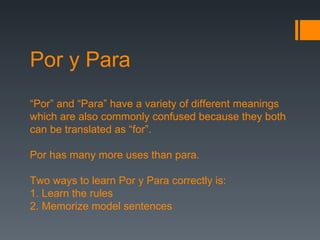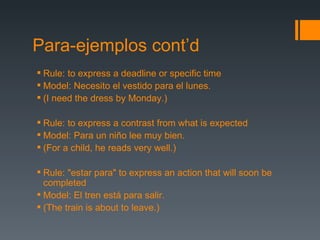Por y para
- 1. Por y Para â Porâ and âParaâ have a variety of different meanings which are also commonly confused because they both can be translated as âforâ. Por has many more uses than para. Two ways to learn Por y Para correctly is: 1. Learn the rules 2. Memorize model sentences
- 2. Por-ejemplos Rule: to express gratitude or apology Model: Gracias por la ayuda. (Thanks for the help.) Rule: when talking about exchange, including sales Model: Ãl me dio diez dÃģlares por el libro. (He gave me ten dollars for the book.) Rule: to mean "on behalf of," or "in favor of," Model: No votÃĐ por nadie. (I didn't vote for anyone.)
- 3. Por-ejemplos contâd Rule: to express a length of time Model: Yo estudiÃĐ por dos horas. (I studied for two hours.) Rule: to express an undetermined, or general time, meaning "during" Model: Se puede ver las estrellas por la noche. (One can see the stars during the night.) Rule: meaning "through," "along," "by" or "in the area of" Model: Andamos por el parque. (We walk through the park.)
- 4. Por-ejemplos contâd Rule: when followed by an infinitive, to express an action that remains to be completed, use por + infinitive Model: La cena estÃĄ por cocinar. (Dinner has yet to be cooked.) Rule: to express cause or reason Model: El hombre muriÃģ por falta de agua. The man died for lack of water. Rule: "estar por" means to be in the mood, or inclined to do something Model: Estoy por tomar cafÃĐ. (I'm in the mood for drinking coffee.)
- 5. Por lo menos-at least Por dentro-inside Por ejemplo-for example Por fin-finally Do not have to write all Por casualidad-by chance only ones you might use Por ahora-for now Por adelantado-in advance Por completo-completely Por desgracia- unfortanetly Por eso-therefore Por lo general-generally Por ningÚn lado-nowhere Por separado-seperately Por supuesto-of course Por suerte-fortunately Por todas partes-everywhere Por-expression
- 6. Para-ejemplos Rule: to indicate destination Model: El hombre saliÃģ para Madrid. (The man left for Madrid.) Rule: to show the use or purpose of a thing Model: El vaso es para agua. (The glass is for water.) Rule: to mean "in order to" or "for the purpose of" Model: Para hacer una paella, primero dore las carnes. To make a paella, first sautÃĐ the meats. Rule: to indicate a recipient Model: Este regalo es para ti. (This gift is for you.)
- 7. Para-ejemplos contâd Rule: to express a deadline or specific time Model: Necesito el vestido para el lunes. (I need the dress by Monday.) Rule: to express a contrast from what is expected Model: Para un niÃąo lee muy bien. (For a child, he reads very well.) Rule: "estar para" to express an action that will soon be completed Model: El tren estÃĄ para salir. (The train is about to leave.)
- 8. It is quite important to learn to use these two prepositions correctly, because if you inadvertently substitute one for the other, you might end up saying something altogether different from what you had intended. Study the two examples Juan comprÃģ el regalo para MarÃa. Juan bought the gift for Maria. (he bought it to give to her) Juan comprÃģ el regalo por MarÃa. Juan bought the gift for Maria. (he bought it because she could not)








